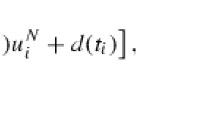Abstract
In this paper, we consider a class of time-lag optimal control problems involving control and terminal inequality constraints. A feasible direction algorithm has been obtained by Teo, Wong, and Clements for solving this class of optimal control problems. It was shown that anyL ∞ accumulation points of the sequence of controls generated by the algorithm satisfy a necessary condition for optimality. However, suchL ∞ accumulation points need not exist. The aim of this paper is to prove a convergence result, which ensures that the sequence of controls generated by the algorithm always has accumulation points in the sense of control measure, and these accumulation points satisfy a necessary condition for optimality for the corresponding relaxed problem.
Similar content being viewed by others
References
Teo, K. L., Wong, K. H., andClements, D. J.,A Feasible Directions Algorithm for Time-Lag Optimal Control Problems with Control and Terminal Inequality Constraints, Journal of Optimization Theory and Applications, Vol. 46, pp. 295–317, 1985.
Polak, E., andMayne, D. Q.,A Feasible Directions Algorithm for Optimal Control Problems with Control and Terminal Inequality Constraints, IEEE Transactions on Automatic Control, Vol. AC-22, pp. 741–751, 1977.
Teo, K. L., andWu, Z. S.,Computational Methods for Optimizing Distributed Systems, Academic Press, New York, New York, 1984.
Williamson, L. J., andPolak, E.,Relaxed Controls and the Convergence of Algorithms, SIAM Journal on Control and Optimization, Vol. 14, pp. 737–756, 1976.
Teo, K. L.,Convergence of a Conditional Gradient Algorithm for Relaxed Controls Involving First Boundary-Value Problems of Parabolic Type, Numerical Functional Analysis and Optimization, Vol. 6, pp. 457–491, 1983.
Teo, K. L., Clements, D. J., Wu, Z. S., andChoo, K. G.,Convergence of a Strong Variational Algorithm for Relaxed Controls Involving a Class of Hyperbolic Systems, Journal of Optimization Theory and Applications, Vol. 42, pp. 467–485, 1984.
Murray, J. M., andTeo, K. L.,On a Computational Algorithm for a Class of Optimal Control Problems Involving Discrete Time-Delayed Arguments, Journal of the Australian Mathematical Society, Series B, Vo. 20, pp. 315–343, 1978.
Wong, K. H., andTeo, K. L.,A Conditional Gradient Method for a Class of Time-Lag Optimal Control Problems, Journal of the Australian Mathematical Society, Series B, Vol. 25, pp. 518–537, 1984.
Author information
Authors and Affiliations
Additional information
Communicated by E. Polak
This work was done when the first author was on sabbatical leave at the School of Mathematics, University of New South Wales, Australia.
Rights and permissions
About this article
Cite this article
Wilson, S.J., Wong, K.H. Convergence of a feasible directions algorithm for relaxed controls in time-lag systems. J Optim Theory Appl 53, 461–474 (1987). https://doi.org/10.1007/BF00938950
Issue Date:
DOI: https://doi.org/10.1007/BF00938950




